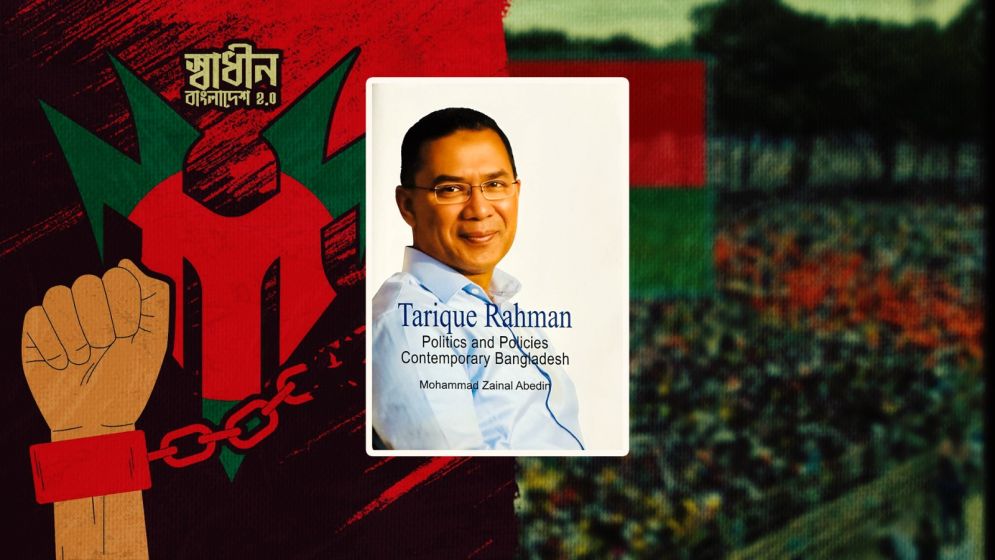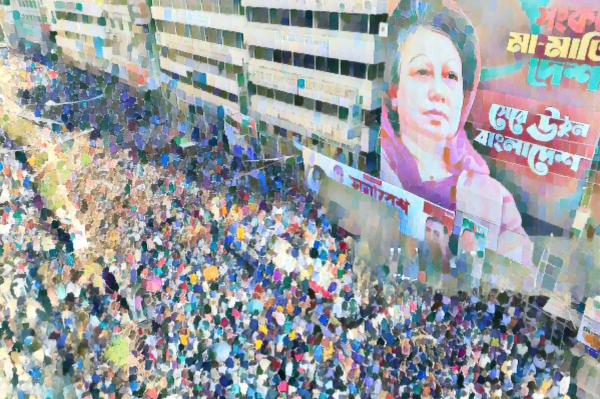New book explores Tarique Rahman’s struggles and visionary political agenda

In the book Tarique
Rahman: Politics and Policies, the author Mohammad Zainul Abedin offers a
comprehensive political biography that not only charts the life of Tarique
Rahman, a pivotal figure in Bangladesh politics, but also provides a nuanced
analysis of the nation’s contemporary political crises.
The book deftly intertwines the personal with the political,
framing Tarique’s story within the broader context of Bangladesh’s volatile
political landscape.
Structured with precision, the work casts a critical eye on
the governance of the Awami League, highlighting the profound challenges
Tarique faces as a political leader and reflecting on the larger ramifications
for the country’s democracy, justice system, and socio-economic fabric.
One of the most compelling features of this volume is its
examination of the erosion of democratic norms in Bangladesh.
In its opening chapter, the author critically explores what
is referred to as an "unwritten one-party rule" under the Awami
League, contending that the ruling party has systematically undermined
democratic institutions to preserve its power.
Tarique Rahman emerges in this analysis not merely as a
politician but as a symbol of resistance, positioned as a counterforce to the
excesses of an increasingly authoritarian government.
Chapter Six, titled A
Victim of Conspiracy, shifts focus to Tarique’s legal and media battles,
revealing how disinformation campaigns and politically motivated lawsuits have
been used to tarnish his reputation and neutralize him as an opposition figure.
Drawing upon a wealth of legal documentation and media
reports, the book constructs a powerful argument that paints Tarique as one of
the most politically victimized leaders in modern Bangladesh, suggesting that
his persecution serves as a strategic tool in the ruling party’s consolidation
of power.
Yet the book does not reduce itself solely to a political
critique. In Chapter Five, Empowering
People: An Expert Policy Maker, the author expands the narrative to include
Tarique’s role in shaping public policy, particularly in the realm of
agriculture.
The chapter presents Tarique as a thoughtful policymaker,
whose initiatives have sought to address critical issues such as food security
and the economic empowerment of rural communities.
This section highlights his broader vision for an economically self-sufficient Bangladesh.

Portraying the personality
Further diversifying its scope, Chapter Three, The Philanthropic Person, delves into
Tarique’s charitable work, focusing on his involvement in various welfare
initiatives such as the Ziaur Rahman Foundation, the Komol Seed Project, and
the Asthma Care and Prevention Center.
The author posits that these efforts reflect Rahman’s deep
commitment to public health and poverty alleviation—issues that have often been
sidelined by successive administrations.
Perhaps the most provocative section of the book is Chapter
Nine, Misrule of Law, which delves
into the politicization of the judiciary under the ruling Awami League.
Using detailed case studies—including the controversial
imprisonment of Begum Khaleda Zia and the judicial anomalies surrounding
Tarique’s own legal struggles—the author argues that Bangladesh’s courts have
become tools for silencing opposition figures, particularly within the
Bangladesh Nationalist Party (BNP).
This raises urgent concerns about the erosion of legal
impartiality in a country where the judiciary is increasingly viewed as
compromised.
The theme of judicial manipulation extends further into
Chapter Fourteen, Tarique Rahman on Why the BNP Is Boycotting the Bangladesh
Elections, where the author contextualizes the BNP's decision to refrain from
participating in elections that are seen as fundamentally flawed.
The lack of a neutral election-time government, a
long-standing demand of the opposition, is presented as evidence of the Awami
League’s unwillingness to ensure fair and free elections.
Beyond the political critique, the book also explores
Tarique’s vision for Bangladesh’s future. In the concluding chapters, the
author makes a compelling case for Tarique as a leader capable of navigating
the country out of its current political quagmire.
Chapter Thirteen, Concluding
Comments & The Promised Policies: Why Tarique Rahman Is Inevitable,
outlines a bold roadmap for political and constitutional reforms, proposing the
introduction of a bicameral parliament, a referendum system, and a non-party
caretaker government to oversee elections.
These proposals are presented as essential steps toward restoring democracy and fostering fair political competition in Bangladesh.

The visionary leader
The final chapter, Independence
2.0, takes a forward-looking approach, exploring the role of Generation Z
and digital activism in shaping the future of political movements in
Bangladesh.
It highlights the importance of youth engagement in the
ongoing struggle for democracy and presents Tarique Rahman as a figure who not
only acknowledges the generational shift but is also prepared to harness it to
push for change.
This book is a thoroughly engaging and meticulously
researched exploration of Bangladesh’s political landscape.
Far from being just a biography, it serves as a political
manifesto, a critique of authoritarianism, and a passionate call for systemic
reform.
It portrays Tarique Rahman as both a victim of political
persecution and a forward-thinking leader ready to confront the nation’s most
urgent challenges.
While the book effectively underscores Rahman’s contributions
and critiques the authoritarian tendencies of the ruling government, it is not
without its shortcomings. The narrative tends to focus heavily on Tarique’s
victimization, at times to the detriment of a more balanced analysis.
Although the book thoroughly documents the Awami League’s
authoritarian governance, a deeper exploration of the BNP’s own political
flaws, past governance missteps, and internal struggles would have enriched the
overall argument.
Furthermore, the book often presents Tarique’s leadership as
the singular viable solution for Bangladesh’s future, without fully engaging
with alternative political paths or considering emerging leaders within the BNP
or beyond.
Despite these limitations, the book remains an essential read
for political analysts, South Asian scholars, and anyone interested in the
future of democracy in Bangladesh.
Its in-depth analysis and thought-provoking perspectives make
it a valuable contribution to the ongoing discourse on the country’s political
trajectory.
—-
Md Jobayer Hossain is the Country
Coordinator for Malaysia & Singapore, Amnesty International UK. You can
reach him at [email protected]

